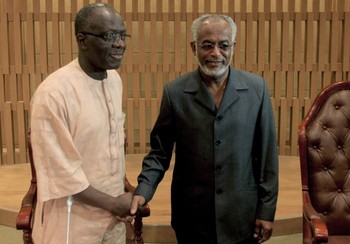AU’s Peace and Security Council delegation arrives in Sudan
March 17, 2013 (KHARTOUM) – A delegation from the AU Peace and Security Council (AUPSC) arrived in Khartoum on Sunday and held a meeting with Sudan’s Minister of Foreign Affairs Ali Karti focused mainly on developments of the peace process and the situation in Darfur.

“We came to listen the government’s views, and to clearly assess the situation on the ground to determine opportunities and challenges in order to enhance the work of the AU’s mission to arrive at a lasting peace in Sudan” Zoom said.
Zoom pointed out that the delegation’s mission is aimed at promoting peace and rendering support to all parties that are seeking it as well as encouraging dialogue and drawing attention that their visit to Darfur today is intended at engaging all parties including rebel grpups into peace talks.
The Sudanese foreign minister said that cooperation with the AUPSC kept the Sudanese crisis within the boundaries of the “African house” and helped eschewing evils of internationalization.
The delegation is expected to meet with the heads of the African diplomatic missions accredited to Khartoum.
On Monday, the delegation will travel to the state of North Darfur to meet with governor Mohamed Kibir and visit the headquarters of the UNMID in El-Fasher as well as visiting Kabkabiya area then proceed to the capital of South Darfur, Nyala to meet with governor Hamad Ismail.
Conflict has raged in the vast arid region of Darfur for almost a decade since mainly non-Arab tribes took up arms against the Arab government in Khartoum in 2003, accusing it of political and economic neglect.
In 2008, the United Nations said some 300,000 people may have died in Darfur’s war, a figure some activists say is too low. The government has put the death toll around 10,000.
Violence has ebbed since a peak in 2003/2004 but has picked up again in the past few months.
This month heavy fighting broke out between two Arab tribes over gold in the Jebel Amer area in North Darfur, displacing or severely affecting 100,000 people, the United Nations said. It had previously reported 70,000 displaced people.
Rebel divisions and a string of broken ceasefires have scuppered years of international mediation and several rounds of peace talks. Banditry has also spread.
The United Nations Security Council (UNSC) authorized a Darfur peacekeeping force in 2008 as the largest and most expensive peacekeeping operation in the world, employing more than 25,000 military, police and civilian staff.
But critics say that a vague mandate and restrictions imposed by Khartoum has undermined the efficiency of the force.
A peace agreement signed in Doha two years ago between Khartoum and an umbrella of rebel groups left out several major movements that refused to become signatories.
(ST)
